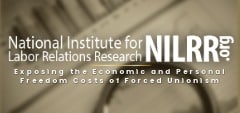Union Monopoly Bargaining Harms Millions of American Workers
Union Contracts ‘Reduce Wage Dispersion . . . by Reducing Pay of the Most Productive Workers’
Apologists for compulsory unionism often suggest, with little or no evidence, that employees who oppose unionization of their workplace have no good reason for believing they would be harmed by a Big Labor takeover. In a recent op-ed opposing passage of an Indiana Right to Work law written for the South Bend (Ind.) Tribune, for example, Notre Dame professors Barbara Fick and Marty Wolfson simply assume, without making an argument or citing any facts, that union nonmembers subject to “exclusive” (monopoly) union representation in the workplace thereby “enjoy . . . benefits.”
As popular as this assumption is with union officials and their allies in academia, it is far from substantiated. Moreover, in examining labor-management relations outside the context of the ongoing debate over state Right to Work laws, which prohibit the firing of employees for refusal to pay dues or fees to an unwanted union, a number of proponents of forced unionism have acknowledged, tacitly or explicitly, that unionization is detrimental to the economic interests of many employees.
Take, for example, Richard Rothstein. He is a longtime research associate with the Washington, D.C.-based Economic Policy Institute (EPI). Each year, the officers of a broad spectrum of labor unions funnel millions of dollars from their forced dues-funded treasuries into the EPI, which they obviously regard as an ideological ally. Yet Rothstein has made no bones about the fact that workers whose productivity is above-average typically get paid less when they are unionized:
In [unionized] firms, wages of lower paid workers are raised above the market rate, with the increase offset . . . [in part] by reducing pay of the most productive workers. If firms with this practice are rare, competitors will be able to bid away their best workers.
Rothstein’s understanding of how union contracts work is perfectly standard. In fact, in the passage cited he is actually summarizing an article coauthored by another prominent pro-forced unionism academic, Laura D’Andrea Tyson. And both Rothstein and Tyson are simply echoing the views of Harvard economist Richard Freeman, arguably the leading academic apologist for forced unionism in the U.S. Freeman has actually commended union officials for being “remarkably successful in removing performance judgments as a factor in determining individual workers’ pay.”
Of course, Rothstein, D’Andrea Tyson, Freeman, and other likeminded analysts of labor policy do not regard the fact that monopoly union representation routinely lowers the pay of employees with above-average productivity as an argument against it. On the contrary, they commend such “compression of wages” as a blow for employee “solidarity.”
Do Notre Dame professors Fick and Wolfson dissent from the consensus as expressed by Freeman and other major figures in their field that workers who stand to benefit economically if their employer takes their personal performance into account stand to lose if a union contract prevents their employer from doing so? If they do, they should explain why, rather than pretend the consensus does not exist.
On the other hand, if Fick and Wolfson do acknowledge that union contracts normally reduce the pay of “the most productive workers,” then it makes no sense for them to oppose enactment of an Indiana Right to Work law on the grounds that union nonmembers invariably “benefit” from unionization!
So-called “compression of wages” is just one of a number of ways in which large numbers of employees are economically harmed by union contracts. To take another example, extensive research has shown that unionized firms “shed jobs more frequently and expand less frequently than nonunion firms.” Inevitably, that means rank-and-file employees looking for promotion opportunities will find far fewer of them at unionized firms. And in addition to economic damage, many employees suffer noneconomic, but genuine, harm when they are forced to associate with a union whose moral and political values they do not share.
In short, there are multiple sound reasons why an independent-minded employee might consider having a union as his monopoly-bargaining agent to be a detriment, rather than a benefit. And the individual employee, rather than anyone else, including Notre Dame academics, is the best judge of whether he or she benefits. Right to Work laws acknowledge this truth. And it is the best single reason for making Indiana a Right to Work state.
# # #
Nothing here is to be construed as an attempt to aid or hinder the passage of any bill before Congress or any state legislature.
See the EPI’s 2008-2009 Annual Report, p. 27, and “About the EPI” at http://www.epi.org – the “think tank’s” web site.
“Participation, Productivity, and the Firm’s Environment,” published in Alan Blinder, ed., Paying For Productivity, Brookings Institution, Washington, D.C., 1990, pp. 183-243.
| NILRR Fact Sheet — Union Monopoly Bargaining Harms Millions of American Workers.pdf | 240.1 KB |

